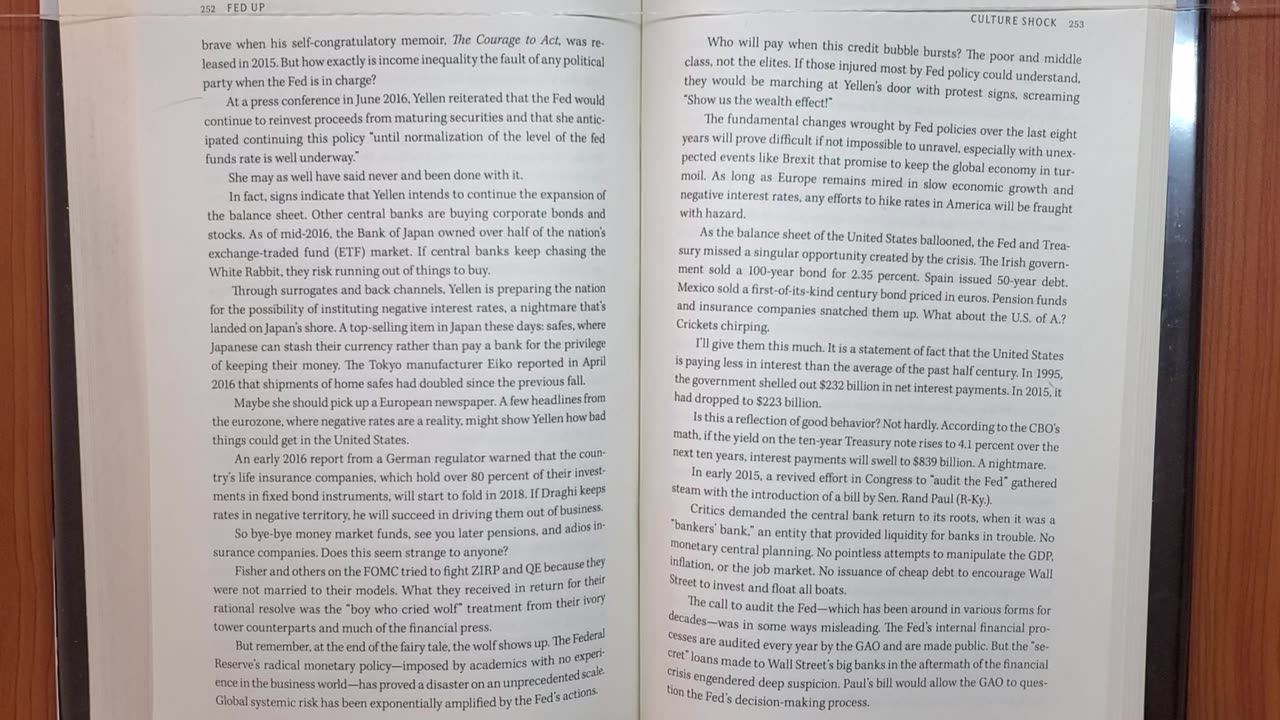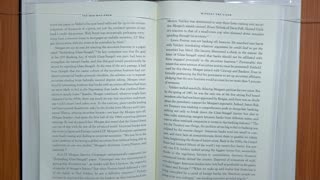Premium Only Content

Fed Up: 231225 Why the Federal Reserve is Bad 2017 by Danielle DiMartino Booth Audio/Video Book S013
Fed Up: 231225 Why the Federal Reserve is Bad 2017 by Danielle DiMartino Booth Audio/Video Book S013
An Insider's Take on Why the Federal Reserve is Bad for America 2017
by Danielle DiMartino Booth
Amateur Audio Video Book Reading, Unrehearsed Book Reading Session
Check the playlist for the entire series. You can read along with me.
Start Date: 8/31/2023
** If you are the Book Publisher or Rights Holder & Don't Want These Videos Shared, Please Contact Me Directly for Immediate Action - Thank You. MyAnalogBooks (at) Gmail (dot) com **
* Full Reading List: https://bit.ly/analogvideobooks
* https://www.buymeacoffee.com/analogbooks
* Rumble: https://rumble.com/c/AnalogVideoBooks
* AfreecaTV: https://bj.afreecatv.com/analogbooks/vods
* AfreecaTV Playlist: https://bj.afreecatv.com/analogbooks/vods/list
Publisher : Portfolio 2017
Paperback : 336 Pages
Authors: Daniel DiMartino Booth
Danielle DiMartino Booth makes bold predictions based on meticulous research and her years of experience in central banking and on Wall Street. Known for sounding an early warning about the housing bubble in the 2000s, Danielle offers a unique perspective to audiences seeking expertise in the financial markets, the economy, and the intersection of central banking and politics.
Called "The Dallas Fed's Resident Soothsayer" by D Magazine, Danielle is a well-known speaker who can tailor her message to a myriad of audiences, once spending a week crossing the ocean to present to groups as diverse as the Portfolio Management Institute in Newport Beach, the Global Interdependence Center in London and the Four States Forestry Association in Texarkana. Her success is based on her ability to translate the arcane language of Wall Street thinkers and Fed insiders to the man on the street. Danielle is regularly featured on CNBC and Bloomberg.
From Wall Street to respected columnist to Fed Advisor, Danielle spent nine years as a Senior Financial Analyst with the Federal Reserve of Dallas and served as an Advisor on monetary policy to Dallas Federal Reserve President Richard W. Fisher until his retirement. Fisher called on Danielle to serve at the Fed after becoming a loyal reader of her financial column in the Dallas Morning News. She began her career in New York at Credit Suisse and Donaldson, Lufkin & Jenrette where she worked in the fixed income, public equity and private equity markets. Danielle earned her BBA as a College of Business Scholar at the University of Texas at San Antonio. She holds an MBA in Finance and International Business from the University of Texas at Austin and an MS in Journalism from Columbia
After correctly predicting the housing crash of 2008 and quitting her high-ranking Wall Street job, Danielle DiMartino Booth was surprised to find herself recruited as an analyst at the Federal Reserve Bank of Dallas, one of the regional centers of our complicated and widely misunderstood Federal Reserve System. She was shocked to discover just how much tunnel vision, arrogance, liberal dogma, and abuse of power drove the core policies of the Fed.
DiMartino Booth found a cabal of unelected academics who made decisions without the slightest understanding of the real world, just a slavish devotion to their theoretical models. Over the next nine years, she and her boss, Richard Fisher, tried to speak up about the dangers of Fed policies such as quantitative easing and deeply depressed interest rates. But as she puts it, “In a world rendered unsafe by banks that were too big to fail, we came to understand that the Fed was simply too big to fight.”
Now DiMartino Booth explains what really happened to our economy after the fateful date of December 8, 2008, when the Federal Open Market Committee approved a grand and unprecedented experiment: lowering interest rates to zero and flooding America with easy money. As she feared, millions of individuals, small businesses, and major corporations made rational choices that didn’t line up with the Fed’s “wealth effect” models. The result: eight years and counting of a sluggish “recovery” that barely feels like a recovery at all.
While easy money has kept Wall Street and the wealthy afloat and thriving, Main Street isn’t doing so well. Nearly half of men eighteen to thirty-four live with their parents, the highest level since the end of the Great Depression. Incomes are barely increasing for anyone not in the top ten percent of earners. And for those approaching or already in retirement, extremely low interest rates have caused their savings to stagnate. Millions have been left vulnerable and afraid.
Perhaps worst of all, when the next financial crisis arrives, the Fed will have no tools left for managing the panic that ensues. And then what?
#audiobook #videobook #education #fed #federalreserve #banking #bankingsystem #stocks #stockmarket #bankreserves #banks #money #currency #fiat #gold #fractionalreservebanking #capitalmarkets #centralbanking #centralbanks $spy $qqq $iwm $dia $spx $ndx #economics #macroeconomics
-
 20:07
20:07
Analog Video Books - Read with Me
7 days agoThe Man Who Knew 036 Alan Greenspan by Sebastian Mallaby 2016 Audio/Video Book S036
411 -
 4:31
4:31
CoachTY
20 hours ago $19.28 earnedCOINBASE AND DESCI !!!!
97.8K9 -
 10:02
10:02
MichaelBisping
20 hours agoBISPING: "Was FURY ROBBED?!" | Oleksandr Usyk vs Tyson Fury 2 INSTANT REACTION
47.2K12 -
 8:08
8:08
Guns & Gadgets 2nd Amendment News
2 days ago16 States Join Forces To Sue Firearm Manufacturers Out of Business - 1st Target = GLOCK
84.5K86 -
 10:17
10:17
Dermatologist Dr. Dustin Portela
2 days ago $17.24 earnedOlay Cleansing Melts: Dermatologist's Honest Review
127K10 -
 1:02:20
1:02:20
Trumpet Daily
2 days ago $39.71 earnedObama’s Fake World Comes Crashing Down - Trumpet Daily | Dec. 20, 2024
85.1K58 -
 6:29
6:29
BIG NEM
1 day agoCultivating God Mode: Ancient Taoist NoFap Practices
63.2K13 -
 30:53
30:53
Uncommon Sense In Current Times
2 days ago $10.66 earned"Pardon or Peril? How Biden’s Clemency Actions Could Backfire"
77.9K5 -
 40:01
40:01
CarlCrusher
1 day agoSkinwalker Encounters in the Haunted Canyons of Magic Mesa - ep 4
72.4K9 -
 59:44
59:44
PMG
2 days ago $9.71 earned"BETRAYAL - Johnson's New Spending Bill EXPANDS COVID Plandemic Powers"
74.2K46